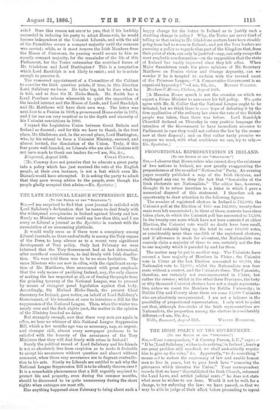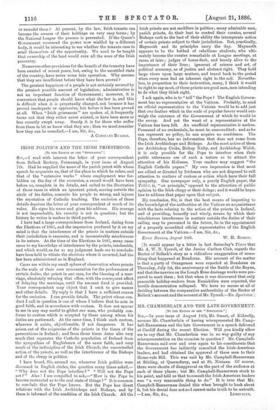THE IRISH POLICY OF THE GOVERNMENT.
[To THE EDITOR OF THE " SPECTATOR." J SIR,—Your correspondent, "A Country Parson, L.U.," says :— " If he [Lord Salisbury] wishes to do nothing [in Ireland], leaving our great problem still unsolved, we shall undoubtedly require him to give up the reins," &c. Apparently," to do something" means not to restore the supremacy of law and enable honest men to live in peace, but to pass fresh laws " removing the grievances which threaten the Union." Your correspondent records that we have " disestablished the Irish Church, reformed the Land Laws, and settled judicial rents ;" he does not state what more he wishes to see done. Would it not be well, for a change, to try enforcing the laws we have passed, so that we may be able to judge of their effect lefore proceeding to repeal
or remodel them ? At present, by the law, Irish tenants can become the owners of their holdings on very easy terms ; by the National League the process is prevented. If the Queen's Government recovered the power now wielded by a different body, it would be interesting to see whether the tenants care to avail themselves of the opportunity. We used to be taught that ownership of the land would cure all the woes of the Irish peasantry.
Numerous other provisions for the benefit of the tenantry have been enacted of recent years, but, owing to the unsettled state of the country, have never come into operation. Why assume that they are insufficient before they have been proved ?
The greatest happiness of a people is not certainly secured by the greatest possible amount of legislation ; administration is not an important function of Government ; moreover, it is convenient that people should know what the law is, and this is difficult when it is perpetually changed, not because it has proved inadequate or oppressive, but before it has been proved at all. When "Irish grievances" are spoken of, it frequently turns out that they either never existed, or have been more or less recently swept away. Surely it is for those who suffer from them to let us know what they are ; then we must consider how they can be remedied.—I am, Sir, &c., A CONSTANT READER.



































 Previous page
Previous page